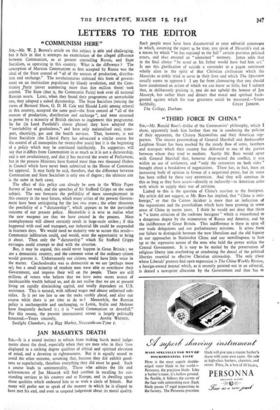JAN MASARYK'S DEATH Snt,—It is a sound instinct to refrain
from making harsh moral judge- ments about the dead, especially when they are men who in their lives displayed to a striking degree qualities of ethical and spiritual elevation of mind, and a devotion to righteousness. But it is equally sound to avoid the other extreme, assuming that, because they did exhibit good- ness so superlatively, therefore everything they did must be good. Such a course leads to sentimentality. Those wbo admire the life and achievements of Jan Masaryk will find comfort in recalling his out- standing services to his country and to Europe, and in dwelling upon those qualities which endeared him to so wide a circle of friends. But many will prefer not to speak of the manner in. which he is.alleged to have met his end, and even to suspend judgement about its moral quality. Such people must have been disconcerted at your editorial comments in which, assuming the report to be true, you speak of Masaryk's end as a means by which " he has expiated to the full" certain previous political errors, and thus ensured an " unstained " memory. Janus adds that in the final choice " he acted as his father would have had him act." Is not this glorification of suicide a surrender to a pagan sentiment wholly alien to the spirit of that Christian civilisation which the Masaryks so nobly tried to serve in their lives and which The Spectator usually seems to approve ? I am far from clamouring that you should have condemned an action of which we can know so little, but I submit that, in deliberately praising it, you do not uphold the honour of Jan Masaryk, but rather blurr and distort that moral and spiritual back- ground against which his true greatness could be measured.—Yours






























 Previous page
Previous page